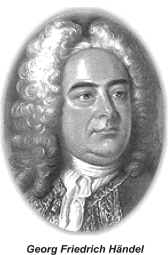| HäNDEL'S MASTERPIECE OF FAITH | |
 For twenty-four days, Georg Friedrich Händel did not leave his house. His servant brought him trays of food, but he ate only a little. Completely immersed in composition and Bible reading, he let nothing deter him from the colossal work at hand. As he put the finishing touches on the "Hallelujah Chorus," he turned to his servant with tears in his eyes and exclaimed: "I did think I did see all Heaven before me, and the great God Himself!" Since 1742, generations of music lovers around the world have risen to their feet at the awe-inspiring, majestic sound of Händel's Messiah. Though this renowned oratorio is only one of his masterpieces, it points straight to the heart of this composer known for his prodigious passions for life, for music, for his God. Händel was born in Halle, Germany on February 23, 1685. His mother was a minister's daughter, a pious woman whom Händel revered all his life. His father, Georg, was a no-nonsense surgeon who held a court appointment in a nearby royal household. Accompanying his father on many of his trips to court, Händel taught himself to play several palace instruments. Although an obviously gifted child, a prodigy in fact, his father was displeased; he wanted his son to pursue a degree in law. One day, nine-year-old Händel was asked to play the organ postlude at a royal church service. His playing was so brilliant that he caught the notice of a duke, who pressed Händel's reluctant father to let him take formal lessons. His father agreed, and Händel went to study with the organist at their local church. By 18, Händel was a mature composer with a growing reputation. Many critics agree that Händel was at his best when he composed religious music. Patrick Kavanaugh writes in The Spiritual Lives Of Great Com-posers: "Händel throughout his life manifested a deep sense of religion. In conversation he would frequently declare the pleasure he felt in setting the Scriptures to music..." He was bold and expressive in everything he did, and his passion about his faith in God was no exception. Händel met trials and misfortune that might have crushed others who did not have faith in God. Out of pure spite, rival music companies would sometimes schedule their orchestral productions the same night as Händel's performances. Yet Händel was never malicious in return. He was forgiving and did not seek to retaliate, though he came close to bankruptcy and suffered several physical breakdowns. Händel was a peacemaker at heart. Sometimes the conflicts Händel faced came from those within the church. Many well-meaning church leaders were angry with him for performing Biblical music, including the Messiah, in secular theatres. They preached against him angrily, and some even hired children to remove the notices of his performances. Still, Händel did not speak against them and accepted their criticism without bearing a grudge. In times of good fortune as well as bad, Händel was generous with his money. He tried to ease suffering wherever he saw a need. Although a bachelor all his life, Händel cared tenderly for children. In fact, it was his love for unfortunate children that helped bring the Messiah into being. He composed it for a benefit to raise money for an orphan's hospital and other charities. In 1751, Händel faced his most serious personal crisis. His eyes gave him trouble when he composed. Like his contem-porary, Bach, he became blind. The thought that terrified him the most was not the darkness, but the inactivity. He hated to be helpless and idle. But Händel did not give up; he knew where to find strength. He continued to attend church regularly, filling his other hours with practice on his harpsichord and organizing performances of his works. One week before he died in April 1759, Händel conducted his last scheduled performance of his Messiah. "He carried it through to the end without seeming fatigued, but he knew his time to leave this world was soon to come," says Jane Smith in A Gift Of Music. "He told some friends that he had one desire ...'I want to die on Good Friday, in the hope of rejoining the good God, my sweet Lord and Saviour, on the day of His resurrection.'" As he lay weakened in his bed on Good Friday, he told his servant, "I have now done with the world." He died before the next morning. On his gravestone in Westminster Abbey are inscribed the words to one of his favourite Messiah selections: "I know that my Redeemer liveth." His close friend James Smyth wrote, "He died as he lived - a good Christian, with a true sense of duty to God and to man, and in perfect charity with all the world." www.intouch.org |
|

